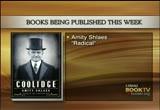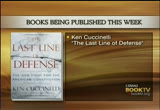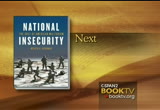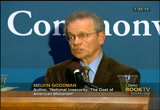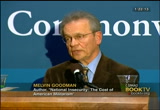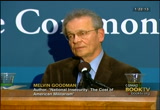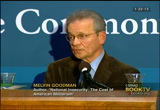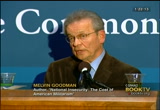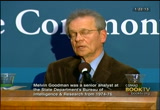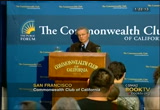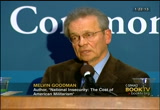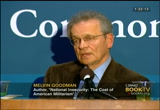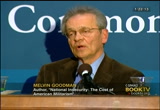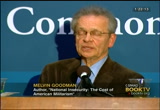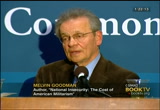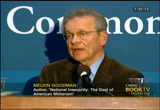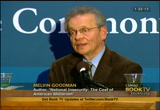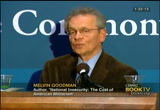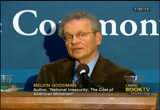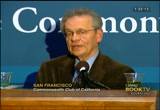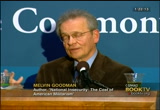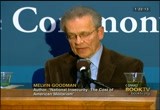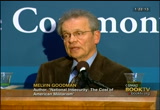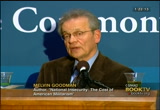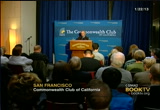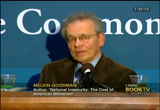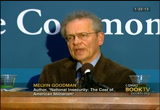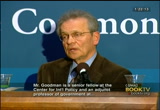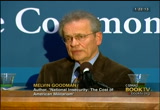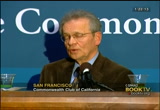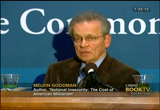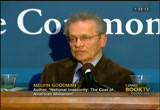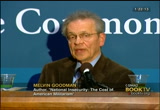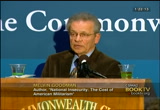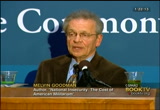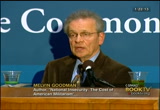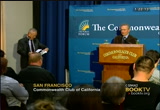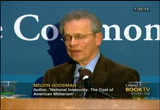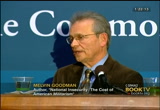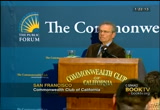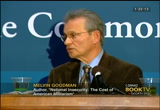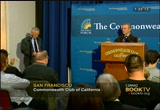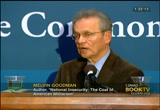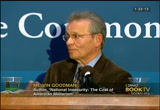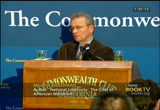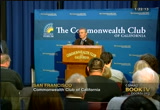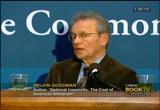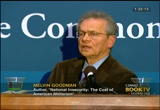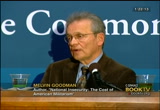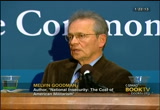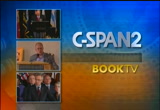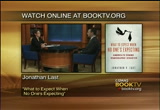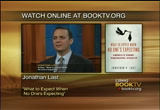tv Book TV CSPAN February 10, 2013 11:00pm-12:00am EST
11:01 pm
11:02 pm
discuss the book. let me say a few things on why i wrote the book in the first place. several years ago, bob gates the secretary of defense noted before he announced he was going to leave the administration that he was going to go back to the state of washington. this is someone i followed closely over the years. i testified against him in 1991 when he was nominated to be the cia director. and as an obama supporter of course i was shocked to find out who was crowned be kept on as obama secretary of defense but when he told people i found interesting and was the major reason i wanted to write this book and what he said was we are moving towards a smaller military that will do fewer things and be able to go fewer places which he felt was a terrible thing and he added i
11:03 pm
don't want to be a part of that kind of system that is going to retrench. my feeling has been we need a smaller military that will do fewer things and go to fewer places. so that is the kind of book i wanted to write. i thought that i should do it even though others have really had ma named a lot of this. i am sure you are familiar with the work of d-nd for example, who wrote things such as the american empire and years before that, john neuhaus, one of my favorite writers wrote in imperial america and other books have dealt with this with an unusual background in the sense that i spent 42 years in the government and the state department, defense department and the cia have security clearances for that entire length of time and i was
11:04 pm
convinced the kind of country in spirit that you need as an intelligence officer should be taken to this field of the defense budget and the military. i was told social security is the third rail of american politics and i guess it is but another rail of american politics and policy is the defense budget and if you look at what you read in the so-called mainstream press including the best of it, "the new york times," 85 to 90% of what we read in the paper and what we read in our magazines comes from officials sources we are getting what people want us to read. it's very difficult for a contrary and to get into the mainstream press and i know that from personal experience. in some ways the easiest thing to do is if you have something to say is try to draft a
11:05 pm
manuscript and see what happens. a starting point for me has to the eisenhower and everyone is familiar with a farewell address from 1961, the warning about the military-industrial complex. i was a student at johns hopkins in 1961 and the president happened to be his brother, milton coming and he used to secretly go back and forth with the students because he met with students from time to time but the press never knew it. he was influential in the eisenhower of fenestration and for example he told us that when eisenhower got the draft about the military-industrial complex she added a congressional and it's there in his own hand but when he gave a speech she dropped congressional and asked his brother why did you do that and then he said it was enough to take on the industry. i couldn't take on the congress, too even though they were the
11:06 pm
great source of frustration years ago in terms of trying to talk sense into people about the size of the military establishment which is now totally out of control. even though i have a few things to say about obama second term because having been very disappointed by the first, i am optimistic that he has learned some lessons being as smart s he is and as reasonable as he is and disappointed with the military because of what happened in afghanistan and what he was told in terms of the surge i expect some different things to happen but i will get to that in a minute. the other things eisenhower did that were important in this frame would be the cross of on your speech he gave in his first term in which he said when we are spending these huge sums of money in the military, we are
11:07 pm
not only spending our wealth, and this is a quote we are spending our labors the genius of our scientists and hopes of our children and we talk about if we didn't build a destroy your how many schools and bridges and power plants you could build or if you didn't to the strategic bomber when you could do with that kind of money and he stopped a lot of things. he didn't buy the report. he didn't buy all of the talk about the missile gap john kennedy unfortunately did buy into even when she was told that the information he was given in the campaign of 1960 was false. eisenhower also talked about the dangers of permanent war, something we should be familiar with because we didn't for the past decade. he talked about civil liberties which didn't get a lot of attention but it should come and if you think of the last ten
11:08 pm
years, and to look at the first ten amendments of the constitution what have we done about the fourth amendment, illegal searches and seizures think of the warrantless eavesdropping for the national security agency there was the killing without due process of al-aulaqi in some people have no problem with that. what about the killing of his son two weeks later also an american citizen fifth amendment talks about due process. the sixth amendment talks about a speedy trial. if you are bradley manning and by not carrying brief for manning. if we want to discuss that we can but we are approaching three years since man has been in jail in of the trial is supposed to start in june and who knows if it really well so that amendment certainly comes into play and then a couple nights ago i saw
11:09 pm
zero dark thirty that started the wrong kind of debate it shouldn't be water torture works or not but whether we should be engaged in torture. the movie monday is the message unfortunately whether it works even though it gives a very implicit but in direct connection the fact of the matter is we learn nothing from but torture and the use of waterboarding that had any important relationship to the killing of osama bin laden. the person from the cia is a retired operations officer who's been allowed to run around and talk about the importance of torture is jose rodriguez is the one who destroyed the torture tapes and they were sadistic in nature as you can imagine to give he claims he destroyed them because it would have compromised the identity of cia
11:10 pm
agents. the people involved in the torture and the of waterboarding were masked so that is nonsense so this is a very dangerous activity for the cia to get into because basically oppose a and rodriguez can write pieces for "the washington post" and other places he's getting the pieces cleared as a former cia official so the civil liberties aspect is important and finally eisenhower said something and formally that wasn't in any of his writings. he was sitting around for may be weeks before he left the white house in december of 1960 with his close advisers if he said god help the united states when the people that sit in the chair i am sitting in the oval office do not understand the military the way that i do and he held off the military into the right
11:11 pm
wing and the congress and a lot of military efforts. i get into it in the book but i won't go into tonight there was a terrible area that he didn't hold off the right wing and the conservatives and the was his use of covert action and this cannot be separated from his overall record because when you look at the cia activities, illegal i would argue they started in the eisenhower administration in 1953 and in guatemala, the bay of pigs plan grew up under the eisenhower of fenestration he was smart enough not to do it and kennedy was dumb enough and not even enough and and experienced enough to try it indonesia, all the covert action that we think about really had its genesis in the terms the president to know
11:12 pm
nothing about the military is important. my book turns in terms of the starting point would be the strategic opportunity this country had in 1989 to 1991 to do things differently than we didn't do which was like having the four presidents who knew nothing about the military, clinton, obama, the younger bush who served in the military but didn't want to deal with the military and the was george herbert walker bush. so when you look at the contributions, these individuals may. it's no surprise tour in the terrible situation that we are in now because there has to be a corrective. when you look at the george herbert walker bush administration he had important people at the defense department, the secretary of defense cheney, his aides at the time for scooter libby and paul
11:13 pm
wolfowitz. this is the key in the iraq war in 2002, 2003 in the planning that took place for that more mackall was based on a tailored pattern of total destruction and outright lies and misconception. in the earlier bush administration to put together a secret paper for the defense planning guidance that talked about unilateralism so instead of taking advantage of the strategic opportunity to turn on the collapse of the berlin wall in 1989 and the collapse of the soviet union in 1991 all of the things we didn't expect to see in our lifetime in the violence i certainly didn't expect to see this when i was involved in government affairs or in the intelligence community. a couple of us wrote about the problems of the soviet union but
11:14 pm
no one expected it to collapse like a house of cards but someone said it was a house of cards how else could collapse? but it was totally not taken by the bush and administration. you that things like the invasion of panama to arrest noriega could ban on the cia payroll for most of the time i was there for nearly two decades. that is the hell of a precedent to set in terms of the use of the military. there is no vision and the bush administration he had a very secure national security adviser as a lot portray as a moderate, scowcroft isn't a moderate he's extremely conservative but he speaks like a moderate and that is a very favorable press but no one had any real ideas about how to deal with this great strategic opportunity. fortunately we had two senators, democrat from georgia and the republican from indiana who just
11:15 pm
defeated the primary that is a loss in trying to create a bipartisan foreign policy in washington and the reduction was probably one of the most important congressional initiatives that we have ever seen. the idea that you could take that kind of money from the defense budget that didn't make the military very happy and apply it to demilitarizing the strategic arsenal of the former soviet union was extremely important. we go from bush to clinton, clinton didn't want to deal with foreign policy like so many presidents they felt they were elected to do domestic things. clinton had no background in foreign policy, no interest in the foreign policy. people say they went to georgetown, the school really wasn't good enough as i am concerned. i hope i am not offending anyone in georgetown she put together a security team all of them were
11:16 pm
gone within a year or two for the most part when you look at christopher and the cia was a very peculiar appointment. he did something that needs to be corrected. he was in the foreign policy bureaucracy as i am concerned he brought to the right wing and abolishing the arms control and disarmed the agency. those we need in washington for the making of policy and he expanded nato you're taking the military and a that is a factor or not and bring more members to draw closer to russia and even bring in as george bush did the former hud republics of the
11:17 pm
soviet union into this alliance and you wonder why the russians are upset about this and he lost his nerve on the things the country needed to do in terms of international agreements need to be a part of the accord and signed a comprehensive test ban treaty needed to be a part of the mines and the ban on the cluster bombs. we should have been a part of banning the use of teenagers in combat. over 100 nations have signed all of these pacts and if you look at the country that didn't, what we call the road nations in the united states saw them get to george bush and it's painful to talk about those eight years the fact that country reelected george bush doesn't say very much for any of us anywhere you boies edmondson use of intelligence on the war to a
11:18 pm
certain degree we certainly had it in the mexican war and the 1840's and the spanish-american war act. but in vietnam, the resolution was based on the misuse of intelligence. but you never had the systematic destruction of intelligence the way you had it in the run-up to the iraq war. you never had a cia director mcgeorge tenet tell the president it would be a slam dunk to give the intelligence of to help you make of your mind, but to help you convince the american people that we need to undertake this war putative is a misuse of intelligence and was false intelligence. and if you look at bush if you take the first three years in 2001 he walked away from the treaty in '71 and '72 the tree was the cornerstone of strategic
11:19 pm
deterrence if you didn't have the defensive missiles whether they work or not and we can argue that leader the only way you can make a sound argument for reducing the number of strategic offensive weapons by not having a defensive system that would be a counter to that deploying the national missile defense and people in california should be very confident only you and alaska have it. i.e. to tell you this it doesn't work because it doesn't know how to recognize a decoy missile from a real muscle even though we put $10 billion a year into it, it's extremely expensive weapons system. we have been at it since the eisenhower administration i don't know how many hundreds of billions have gone into this thing. but there is in california and alaska. then in 2000 to iran which had
11:20 pm
been working with us secretly to quiet the afghan situation will up one morning to find out they were part of the axis of evil. they were quite puzzled having fought a war with iraq for ten years and having nothing to do with north korea. why were they part of the axis of the evil? so a chance we had to improve the u.s. and iranian relationship was really undermined with that speech, and we've been going over this past ten years and in 2002 you get the iraq war, one of the two american war the united states failed to engage in in the past decade. obama unfortunately comes in with very little background in foreign policy never paid attention to it, served in
11:21 pm
washington for two years and was a into a sestak supporter but those that new national security could be a problem when he appointed the secretary of state for domestic reasons the secretary of defense for domestic reasons and appointed a retired marine general to be the national security adviser he lasted a lot a year but leon panetta and i know he's one of your neighbors in california she was captured by the operation mentality of the cia before he'd been in the building more than a month this was a national security team obama also was by the military that's how you got the surge of the forces i think he realizes he had by the military and that is important and one of the reasons why i'm a
11:22 pm
little more optimistic about a second term he's a wise man and foreign policy and if the end of the war and iraq keas meander into words and the the war afghanistan and he's allowing the pentagon and you have to remember when you're looking at the pentagon you are looking at an institution that has defined motor skills and a dinosaur. if you take the pentagon a long time to put something together all but obama has to do and i know it isn't this simple but i would look at the gorbachev experience. he came out of 1985 he gave the secret speech in 1986 denouncing afghanistan to his fellow bureau colleagues as a bleeding wound he had the moxie secretly tell shultz we were getting out that the military was going to get one year to turnaround and the wouldn't feel to. they announced a timetable and
11:23 pm
they were gone. we need to do something similar. they had their chances we had 11 commanders and afghanistan in 11 years take a look at thomas rex book the generals that devotes a lot of attention to this isn't a war we can be successful and the kind of military we have. there is no military that had ever been successful in the counterinsurgency where they have a sanctuary. not only did it have a sanctuary but in outlining pakistan that we provide with billions of dollars of military and economic aid that makes the picture somewhat confusing to disengage from a situation where you are supporting the vertically integrated enterprise that's called the karzai government. but i think that we are finding
11:24 pm
our way to some resolution of the crisis but again i don't know how many years this is going to take the team i think our to get appointments. in fact i wonder why obama wasted so much time on susan rice why don't think is qualified to be the secretary of state and john kerry was voted to becoming the security of national, he was a national nomination and the criticism is silly. anti-semitism. they spent the jewish lobby instead of israel. if you go back to eric miller's
11:25 pm
but he said the lobby on many occasions, so i don't know what to the debate is all about. and i think it is just going to sort of slither away because it doesn't make a lot of sense yet he is a sound man and he has a lot of the qualifications than you would need. i was very disappointed when obama made petraeus the cia director but he took care of that himself and took himself out of the game by giving him a very bad name. [laughter] but what was obama thinking when he took an active duty four-star general that had strong policy decisions on some of the key issues that intelligence officers were going to have to grapple with? i can't think of a better scenario for the political intelligence than having petraeus at the cia.
11:26 pm
that isn't what harry truman had in mind. he didn't want to put it in the hands of policy makers, and certainly not in the hands of military policy makers. what the cia was created for is to challenge the intelligence which is worst-case intelligence and when the cia has done its job correctly, that is what they have done on things such as arms control or vietnam. what needs to be done, and let me check the time here because we don't have a lot of time. let me go over the two areas very quickly. one that deals with the defense budget coming and the other that deals with the need to demilitarize the entire national security system. there is a chapter in the book that deals with the defense budget and i am not going to get into the specifics of the reduction. i would argue that you could take a trillion dollars very easily out of the defense budget over the next ten years you would still have the same level
11:27 pm
of spending that you had in 2007. there wouldn't be any risk to the american national security qiviut we spend as much for defense as the rest of the world combined. we've doubled the defense budget over the past decade. we are responsible for 75% of the sales. sophisticated military equipment, $75 million last year. russia is the second most active merchant of farms and they sell about $5 billion worth of military equipment. you question the whole issue of military aid if it is run by the pentagon. just look at the top six recipients of the military aid and ask yourself what are we getting for this? list of the israel afghanistan, egypt, turkey and iraq. israel shouldn't be getting any aid from the united states.
11:28 pm
they don't need it from the united states. they don't want to get economic aid and they don't need the military, they don't face the threat of require and they have a pretty self-sufficient military industry, highly sophisticated and they can afford to buy the weapons they by. afghanistan, again, we are just feeding this criminal enterprise. who knows what is going to happen when we reduce our presence. pakistan, iraq, you all know what the problems are and the situations. but if you go and you look at the service structure and start with, say nuclear arms, think of the five to $6 trillion that we have invested in the nuclear arms that are in essentially an unusable weapon system faugh what are you going to do? we don't have them anymore. that is how many the country has built since the cold war.
11:29 pm
we still spend over 50, $60 billion a year on our nuclear component. in 2009 a sample committee, the adjacent committee of the military specialists the report to the pentagon said we no longer need to develop a new weapon system, but the price for obama to get the strategic arms control agreement in the congress was to about down to senator john kyl that insisted on $80 billion for the modernization, the new modernization. a ferry on necessary. we don't even have a plan or strategy for all of the nuclear components that are deployed all over this country that create real safety concerns for people that work in this area. there force and the navy are tremendously overbuilt, the spaces are the threat and they face no threat since world war ii. if you look at the last two
11:30 pm
fighter aircraft programs, the f-22 was designed to counter the soviet that was never built so the union is collapsing in the 1980's, something that they missed entirely. the first were supposed to cost 40 to 40 million a copy by the last time it rolled off of the assembly lines i think it was like 160 million now we are repeating that. and again lockheed martin is doing what he always does. he makes sure that there is a component built in every state in this country. 47 states have something to do. even john mccain said he had a sticker shock when he saw with the final cost will be. 11 aircraft carriers and task force china has one carrier and that is from the ukraine navy i
11:31 pm
don't know how they feel about serving on this aircraft carrier but that is what they have. they have over 200 bases and facilities nothing outside of china itself. the marines are larger and more powerful than the british military. when is the last time they conducted the landing the degette a lot of their support for? 1951, the courier and war that they had, they were talking about an expeditionary fighting vehicle. they are getting enough 35 and that is another thing about what we do. every service has its own air force so in addition, you have the army, the navy, the marine corps that has their own capability in terms of the air force. finally, you have the army structure at 547,000. you could save a couple hundred
11:32 pm
billion dollars over the next ten years by reducing that to a reasonable 360,000. so those are just some of the things that could be done that could get you to the trillion dollar figure that some people would say would disarm the united states. it wouldn't. 487 billion has already been agreed to by the senate and the house over the next ten years a sequestration would involve another for under 92 billion which would get you close that there won't be a sequestration. we don't see anyone in the pentagon really working towards this and she's never really asked for at so this creates a serious problem. the demilitarization is an important issue because what we've done as much rice the entire national security process. i have a chapter on the militarization of the intelligence community.
11:33 pm
it deals with all of the military people that have been placed in positions that have been occupied by civilians. bush put in a four-star air star general and michael haydon by the way was responsible at the security agency for the eavesdropping. this didn't come up in the conservation hearing's mengin david petraeus who never should have been put in charge of the cia for very obvious reasons. we haven't had the secretaries of state for over 20 years. shultz and baker were the lowest effective secretaries of the state and he could have been if anyone was willing to listen to colin powell but no one was coming and then he really embarrassed himself by going to the united nations in february of 2003 and repeating the national intelligence estimate from october of 2002 that held the charges against iraq and the nuclear capabilities and terrorism all of them were
11:34 pm
wrong. every single one of them. as of this institution has to be rebuilt and i think that we have to show more revision on the use of diplomacy. we need a timetable for afghanistan. we need to respond to diplomatic situations where obama could look very good in terms of seizing the opportunities. cuba may not be a major opportunity with low hanging fruit. we're the only ones that pursue this idea towards not recognizing cuba. north korea did something interesting in 2009. remember when the journalists stepped across the border and they were arrested and the north koreans made it clear that if you send bill clinton people release these women. they had negotiated the framework of north korea and
11:35 pm
this is something they have to get back to in the bilateral negotiations because only the united states can guarantee the security of north korea by ensuring they are not interested in the regime change. so there is a certain restlessness in the room, and i have probably gone on a wonder than i can. let me close by saying you are not going to change the situation for solve these problems by engaging in the same thinking. this is something robert weinstein set up the policy with joseph mccarthy in the late 1940's. so, it is time to disenthrall ourselves and to deal with the real world as it exists out there and this would require a serious dialogue of and serious change in the people what occupy the positions in all washington
11:36 pm
and that is what the book is about. [applause] >> i took too much time. you should have cut me shorter. [laughter] >> a la questions you touch upon it quite a bit and a lot of people asked the question before you got to it and the question is can we really reduce the defense budget, do you think it is too high and if you think there is any chance of doing so for the, chris? >> welcome the chance of doing anything in congress is fraught with all sorts of apparel and as i said at the outset the defense budget is the third rail of politics. it's hard to mention any savings
11:37 pm
or changes in the defense budget without antagonizing not only the republicans but certain democrats. the senate looks at the weapons programs as jobs programs. they don't look at them as why are we doing this, why are we building this. but lieberman who is now not in the senate but is typical in the huge defense industries in connecticut and we see the submarine for construction for connecticut to have the so-called liberal senators. that is what i read in the mainstream media you know the positions are on the military weapons systems built in california. they don't sound very liberal on any of that. and i am not talking about abolishing the of 35 and asking why were we originally going to build 3200 of them? this was budgeted at something
11:38 pm
like 70 to 80 million. it's now up to 160 million they haven't iron out all of the problems associated with it, it's going to be very difficult because the way the five major military industrial firms have coopted you have a congressman in california, i guess in southern california, you probably don't think that it relates to you in northern california, but the head of the house armed services committee gets more money from lockheed martin than any other conference. 385 of the representatives of the 400 some for lockheed martin there's an air force base and army base lockheed martin has its big r&d facility and he's never served in the military but it's one of the typical chicken hawks who can't build enough of this military equipment.
11:39 pm
some of this goes back to madeleine albright, the secretary of state under bill clinton. we all remember what she set about the indispensable nation, which is a very dangerous talk, but put it in the context that she said if we have to use force, we are america. we are the indispensable nation. evidence of the cia what is your opinion about the report? was a cover-up? >> it was and in operation, that's just silly. the investigation was sent a cover-up, but i wasn't satisfied with the report because it didn't go deeply enough into the
11:40 pm
intelligence failures. i've written about this in my book of intelligence they have intelligence failures, there was a wonderful the inspector general's report done on 9/11 that we will never get to see and i think part of the so-called intelligence reform that has been a setback was to exploit the problems with the cia got wrong in the run-up to 9/11 but when i think of people like the fbi who was ignored by the fbi, and those who were calling for certain intelligence activities in certain areas we could have prevented 9/11 but we don't call that a cover-up we
11:41 pm
couldn't let it every scenario. it developed a scenario which the fbi should never do with its trading to develop one scenario and then create all of your assumptions without looking at the various scenarios the other question was this. jose rodriguez the waterboarding never occurred in your opinion. >> did he say that? he said waterboarding didn't occur. we know that it occurred. rodriquez it is typical the double standard if you are a former cia officer that says things that are attractive to the cia and the supporting of the cia, you can get things clear, so she was instrumental
11:42 pm
and conducting torture and abuse and again i don't want to become california but you do have a professor not here at the university of california berkeley. he's still in california somewhere. he had to write five memos that eric holder did release that permitted torture of a certain level. but my problem with obama has always been the torture the cia conducted went beyond what the justice department said was permissible. the number one is john mccain who was tortured over a long period of time and has been a huge critic of this country conducting torture. what is going to happen to american officials, military and intelligence officials, foreign officials, service officials who lined up in the hands of others
11:43 pm
who know that the united states has been tortured? what did it have to do with ander on the cia in the middle east? that's never been explored the we've always looked at benghazi as the problem of the consulate that was a loosely destructive consulate and i thought it was an intelligence platform. there is a lot of anger and a rendition, torture, abuse, secret prisons, and then we expect that under the rug and obama would address some of this and he hasn't. you know, guantanamo remains open but has written in "the new york times" people in guantanamo are probably better off than if they are brought to the united states to serve and presence in the country given what's happened to guantanamo because the human rights watch and the red cross keeping an eye on
11:44 pm
things. there's tremendous anger throughout the middle east and north africa and that's why americans to a certain amount of risk when they serve overseas and with what just happened in algeria is another reminder of the peril. but all of that is within the context of activity that's been taking place for the last ten years and that is the use of the military violence that needs to be addressed. we need a legal architecture for the use of the drones. israel has drones, hezbollah at least has one and they have the supply to them. what happens when russia starts using them in the soviet republics or china. >> too many things they do
11:45 pm
without thinking to the national missile defense. we could develop national missile defense. it doesn't seem to be slowing anyone down but they still pull the money into it every year because we can do it instead of having the missile defense and get serious about cutting back strategic offensive arms. they haven't been address to. there's a lot of if we have the control that clinton abolished because jesse helms made them nervous and they can address those things. the arms control lobby in the country was quite effective we don't see much of their activity anymore. >> they've been very successful
11:46 pm
after world war ii the difficulty in iraq and afghanistan. >> the party in afghanistan is the trying to do with the soviets try to do where they take a page out of the playbook which is you come in and try to bill the government. when did they ever have a centralized government? it is run in a decentralized way and what i see happening already in the fact that we've taken off 33,000 on the search forces are no longer there, now they are going back even more aggressively towards the centralization and the warlords are active, the tribes are getting more active, kabul doesn't count for much to begin with but it will count for much less. iraq had some claims to being a nation state but it was sitting on the triad of the kurdish,
11:47 pm
sunni shia but they sat on with force and once you remove that force, we have no plan for what we were going to do. a lot of people thought we went in there for the oil. i don't think so. were we going to stay long term? like of classified briefings from the pentagon and march i believe we were going to be out for the most part by the end of the year. there is no long-term plan. if you want to fault them for something and that is why i think the book is unfair to the military, we discouraged thinking about what to do with regards to iraq suddenly had to work by the seat of our pants and by the time we left we were able to not contribute to anything but we have a false confidence that somehow david petraeus who would turn into an icon conducted the search and then made a difference of was
11:48 pm
started before petraeus got to iraq. they encouraged the sunnis to get involved because of what al qaeda and iraq was doing to the country, incredible violence. and that dealt with a dispute between bin laden and al qaeda in iraq. but again, we formulated this idea we did it for the soviet union and then we differ time devotees are totalitarian groups and they are black box organizations and once again proclamation everyone salutes them. this was someone that walked away from al qaeda. it makes it a very hard to work in that environment because we don't have great intelligence on these organizations. we don't know what we are doing in afghanistan and we don't know what we are doing in iraq.
11:49 pm
islamic we don't know how to go in or how to get out. >> and we have learned that. >> one last question, since you have security clearance when you make a speech or write a book to you have to have clearance? >> who asked that question? i want to speak to you afterwards. i've never submitted any speech or article. this book was submitted these are suggestions or called for. i made some and provided footnotes to display with others and i challenged the ones that i thought had nothing to do with
11:50 pm
11:51 pm
>> former treasury secretary working on the u.s. financial crisis as well as his tenure as the president of the federal reserve bank of new york. a website for but recommendations and sales has launched this week after a year-and-a-half. three of the largest publishers all fund bookish. the founder says bookish hopes to help the industry by helping readers connect with books and authors they love or will come
11:52 pm
to love. san antonio is planning to open a public library that offers only electronic books. the library was named giglio tech and is planning to house 10,000 titles and about 150 for the library patrons to check out. a boom will be one of the nation's first and totally digital public libraries. >> they're the most literate cities in the third straight year. the list is based on research done by mr. miller who looked at the number of bookstores and libraries as well as newspaper circulation and the education level of each of the city's population you can see them by going to u.s. a today. >> a library dhaka was checked out in 1958 made its way back to the new york public library on monday. the 55 years overdue book was returned with an envelope with a check for $100 to cover the
11:53 pm
cost. the manager jennifer says the records don't date back to the 1950's, so it is impossible to know who the book more work was. the overdue book was the biography of a priest title defier of france and xavier. state to date on the breaking news on publishing by liking as on facebook or you can follow us on a trader at booktv or visit the web site, booktv.org and click on news about books.
11:54 pm
>> what role does religion play? it seems to be important in who is going to have children and who is not, but it's in the sense of belief that in attendance the church services or other participation. can you talk about that a little bit? >> it is a fascinating subject because it has changed. if you go back and look at the national statistics report the demographers back then looked at the catholics and protestants and as it happens. over the years conflict fertility increase and demographers said this was the end of catholic fertility. they were no longer special but instead something much more interesting happened. it no longer mattered what your actual belief was to the matter
11:55 pm
if you were jewish or more men are catholic or protestant. all the matter is how often you attended your services and so there's a straight line between the increased fertility etc. so if you go once every two months your fertility is higher than if you go not at all and if you go once a month it is higher still. if you go once a week it is higher still and not only that but your ideal fertility. you go to church you want to have a bigger family than people who do not so you have a split in america did in secular america not only are the fertility rates much lower and in religious american people still not only want a bigger families that had year. if you think about this anecdotally you're on real-life experience when is the last time you saw a family with six or seven kids that didn't go to church every week?
11:56 pm
there are not many of them. a general survey is a longitudinal survey of about 17,000 families and a few go through you can look at the number of people that have four or more children and then look at them by church attendance and the people with four or more children who never go to church is exactly zero. >> of course church also plays an important role in reinforcing family dynamics and encouraging a community of people who have children and perhaps that helps encourage families to have more of them. >> i think so. three-quarters of this in the book which is to what extent having a kid is a raw deal. it's actually a ton of research that suggests any two people are identical by every way, the same race, religion, in come but one
11:57 pm
of them as a parent and one of them as not to read the parent will be six percentage points less happier than the non-parent and that makes sense because having a kid isn't a balancing act is a lot of hard work and that is why it's difficult as i will talk about later it is difficult for the government's to bribe people to having children to read you cannot construct a broad big enough to make up for the 1 million-dollar cost of it and all the late nights and the diapers and the i.t. queue when they are 16 and all that kind of stuff that you can argue them into having children i think and this is largely what churches do and they do not argue that you should have children specifically although some religions do. but the whole purpose of religion regardless is to suggest that there's something bigger than you and i at this moment and that is the prerequisite to give up your license so you know it and have a child now because you believe there is something bigger and more important than you are doing right now and it's
11:58 pm
important to give up your own happiness because you are doing something bigger. >> she was the first presidential wife to be called the first lady and the first to get a college education. what her husband, rutherford b. hayes the celebrated their 25th wedding anniversary in the white house. meet lucey in c-span's new series first lady's influence and image a first of its kind project for television examining the public and private lives of the women that served as the first lady. seize and one begins in a week on president's day on for the 18th at 9 p.m. eastern and pacific on c-span, seize and radio and c-span.org. here's a list of the ten best nonfiction print titles according to the new york times. this list reflect sales as of january 31st.
145 Views
IN COLLECTIONS
CSPAN2 Television Archive
Television Archive  Television Archive News Search Service
Television Archive News Search Service 
Uploaded by TV Archive on

 Live Music Archive
Live Music Archive Librivox Free Audio
Librivox Free Audio Metropolitan Museum
Metropolitan Museum Cleveland Museum of Art
Cleveland Museum of Art Internet Arcade
Internet Arcade Console Living Room
Console Living Room Books to Borrow
Books to Borrow Open Library
Open Library TV News
TV News Understanding 9/11
Understanding 9/11